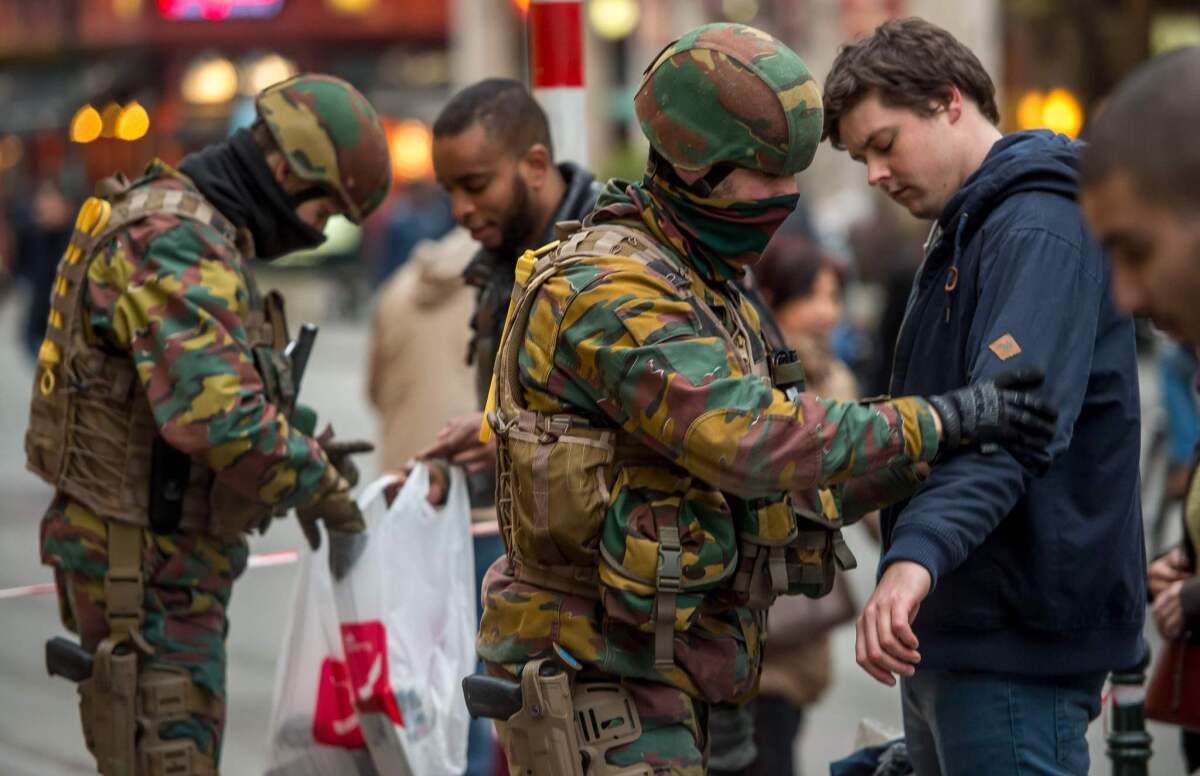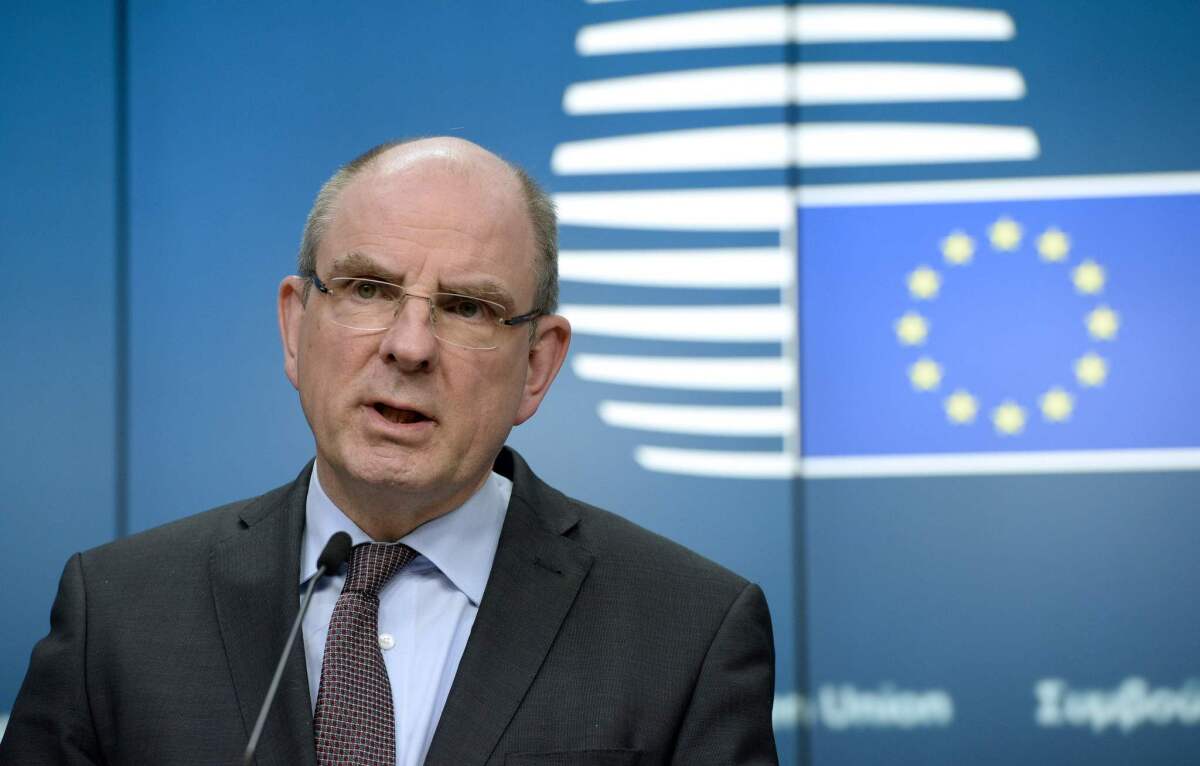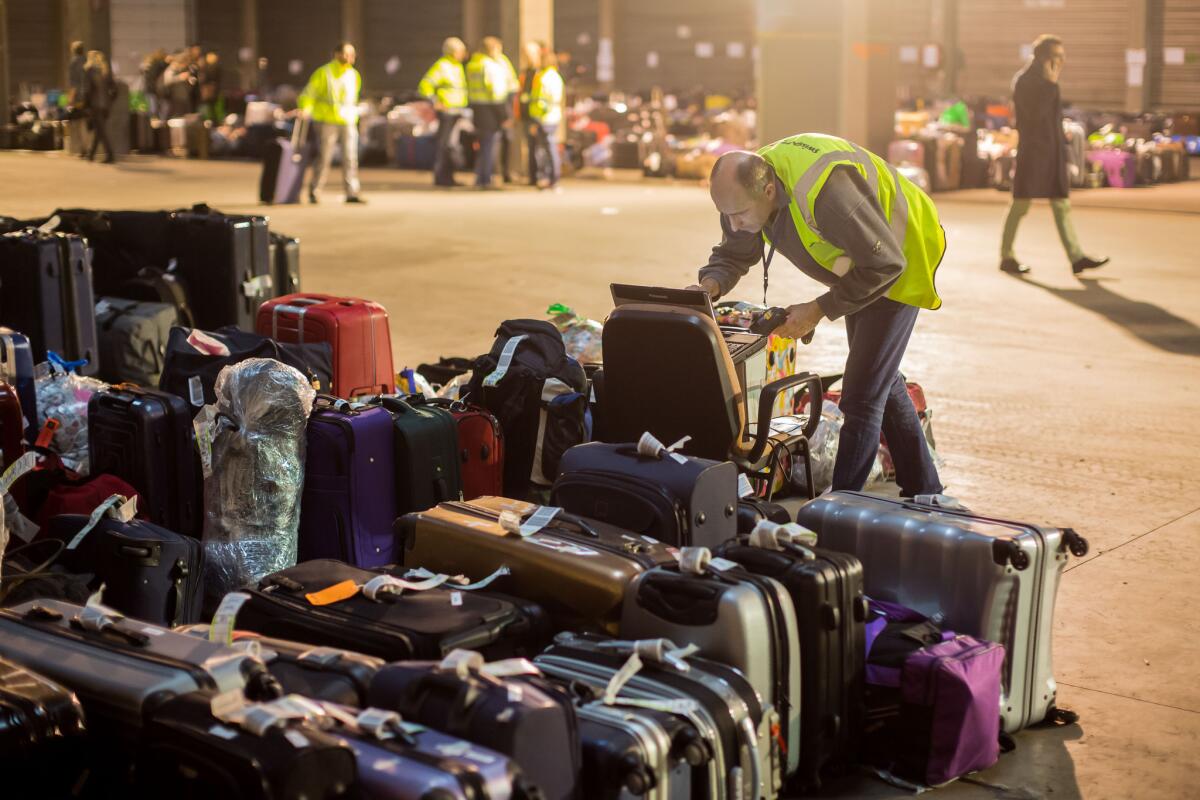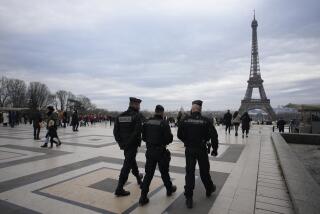‘Mistakes were probably made,’ Belgian official acknowledges after Brussels attacks

Police search passengers at the entrance of a metro station in Brussels on Thursday.
- Share via
Reporting from Brussels — The failure of Belgian authorities to foil deadly attacks on the airport and metro this week has fueled new questions about the nation’s ability to handle the extremist threat and on Thursday prompted two top ministers to offer their resignations.
Belgian Prime Minister Charles Michel refused to accept the resignations, declaring, “In time of war, you cannot leave the field,” according to Interior Minister Jan Jambon.
The offer to stand down from Jambon and Justice Minister Koen Geens came a day after Turkish officials revealed that last year they had expelled as a terrorist one of the men who ultimately took part in this week’s suicide attacks.
Turkish officials said they alerted Belgium, which apparently took no action against the man, Ibrahim El Bakraoui — identified this week as one of the two suicide bombers who struck the airport on Tuesday.
Belgian authorities acknowledged “mistakes,” as this capital was still traumatized from attacks that killed 31 and injured nearly 300.
“Mistakes were probably made by our agencies and in that case secretaries have to take their responsibilities,” Geens acknowledged in comments to Belgian public television. “So if the prime minister deemed it necessary for the stability of his government and our country, we are willing to pay the price. We wouldn’t have offered if mistakes hadn’t been made.”
NEWSLETTER: Get the day’s top headlines from Times Editor Davan Maharaj >>

Belgian Justice Minister Koen Geens talks to the media at the end of a meeting of European Union justice and security ministers in Brussels on Thursday.
Later, however, the justice minister argued that El Bakraoui probably was not the key player in the coordinated strikes on the airport and a metro train.
“He’s only one of the perpetrators, and not even the most enterprising one,” Geens said. “He was not the mastermind of this affair.”
On Thursday, a U.S. official said that at least three of the attackers in Brussels, including Ibrahim (also called Brahim) and Khalid El Bakraoui, brothers of Moroccan descent who were Belgian citizens, were on a U.S. counter-terrorism watch list before Tuesday’s attack. The official, who spoke on condition of anonymity in discussing internal assessments, would not say how their names were added to the list, or whether they were known to U.S. counter-terrorism officials before Ibrahim El Bakraoui’s arrest in Turkey last year.
Najim Laachraoui, who blew himself up at Brussels Airport along with one of the brothers, was also on the U.S. watch list and was known to have traveled to Syria, the official said. Officials believe that Laachraoui was seen pushing a luggage cart and wearing black on the far left of an airport surveillance image released by Belgian authorities.
Laachraoui was also believed to have been a bomb maker in November’s attacks in Paris, U.S. authorities say, one of a number of links between the two terrorist strikes.
Another man in the airport surveillance image, seen wearing a hat and tan jacket, has not been identified publicly and is believed to be on the run.
An undetermined number of U.S. citizens remain unaccounted for after the Brussels attacks, Mark Toner, a State Department spokesman, told reporters in Washington on Thursday. Belgian authorities have not yet released the nationalities of those killed, Toner said. About a dozen U.S. citizens suffered nonfatal injuries in the attacks, the spokesman said.
See more of our top stories on Facebook >>

A Brussels airport worker works on a laptop amid luggage that was left behind during Tuesday’s terrorist attack on Brussels Airport, in a warehouse near the airport on Thursday.
Belgium, a nation of 11 million, has been under fire for what critics call its laggard response to the terrorism threat — especially from Belgian nationals who have traveled to Syria — since the strikes on Paris night spots left 130 people dead. Most participants in those strikes were later identified as Belgian nationals or French citizens who had lived in Belgium, where the attacks were believed to have been planned.
More than 400 Belgian citizens have gone to fight in Syria, according to official estimates, the highest per-capita number among European nations. Authorities estimate that more than 100 have returned home.
Critics have argued that the nation’s fragmented law enforcement and political systems — divided in part because of power splits between the two main language groups, French and Flemish — have helped extremists and criminal gangs operate with near impunity. Greater Brussels, for instance, is divided into 19 communes and six separate police zones. Belgium’s 10 provinces are split into almost 600 municipal councils.
“The place is awash with guns and explosives,” said Christine Fair, a terrorism expert at Georgetown University. “Whereas in the rest of Europe, it is difficult to get these things.... It’s not a coincidence that the Paris attacks were planned in Brussels.”
When a delegation of senior U.S. intelligence officials traveled to Belgium this year, leaders from each of the four Belgian security services refused to attend the same meetings, according to two U.S. officials who described difficulties American officials have faced working with fractious Belgian agencies during terrorism investigations.
The officials described a patchwork of law enforcement and intelligence services in Belgium fighting over turf, understaffed and overwhelmed. The country’s 196 local police forces have strained relationships with the federal police, and law enforcement officials regularly complain that Belgium’s military Intelligence and Security Service and civilian State Security Service bicker with each other and keep everyone else in the dark, the officials said, speaking on condition of anonymity in discussing internal assessments.
Still, Belgian authorities and their defenders reject as ludicrous the “failed state” label that some critics have used to describe the nation.
“People should stop lecturing Belgium,” European Commission President Jean-Claude Juncker of Luxembourg told the Flemish-language daily De Standaard. “Let he who is without sin cast the first stone. There was terrorism in Britain and in Germany in the 1970s and 1980. There was terrorism in Spain, in Italy and much more recently in France.”
Europe has not made widespread changes to how intelligence is shared, such as the reforms made in the U.S. after the failure to connect information on the Sept. 11, 2001, hijackers. The U.S. created the Office of the Director of National Intelligence and the National Counterterrorism Center after the jetliner attacks and beefed up the amount of information on suspected terrorists that is poured into central databases.
The deadly attacks in Paris and Brussels have renewed calls for European countries to share more information on terrorism and criminal networks. In recent years, French intelligence agencies have increased their cooperation with U.S. and British authorities, for example. But German security services are limited by domestic law from sharing some data on German citizens.
In December, the European Union parliament and council reached a deal that would force airlines to hand intelligence services data on passengers such as flight times, addresses, phone numbers and credit card numbers. But the changes have not been implemented widely.
“There is still not robust intelligence sharing within Europe,” Rep. Adam B. Schiff (D-Burbank), the top Democrat on the House Intelligence Committee, said in a telephone interview. “It is still stovepiped.”
“Europe has to decide whether to continue to allow free movement of people within Europe — if they do, they have to make sure information travels faster than Europeans themselves, because that is the only way to stay ahead of the challenge,” he said.
Belgium has not hired terrorism investigators quickly enough to track the large number of Belgians who have traveled to fight in Syria, Schiff said. “I think they are significantly outmatched by the challenge,” he said.
The fact that plotters connected to the Paris attacks were able to pull off this attack during a “heightened state of vigilance shows the limits of what the Belgians are able to do,” Schiff said.
But others argue that no security measures can eliminate the threat of terrorist attacks, as strikes on Israel, the United States and other nations with robust security regimes have demonstrated.
“A database of every Belgian’s fingerprints could not have prevented this,” Belgian Privacy Secretary Bart Tommelein told the local media, referring to this week’s attacks.
And others argue that onerous security steps could backfire, lessening individual freedoms and creating police-state style restrictions incompatible with democracy.
“More checks: Where does that stop?” Mark Singleton, director of the International Center for Counter-Terrorism in The Hague, asked in an article this week in De Standaard. “Pat pupils down coming into school? Terrorism’s goal is dual: attention and destabilizing a society. Draconian measures reinforce the impression that at any moment we can become a target.”
Times staff writer McDonnell reported from Brussels and Bennett from Washington. Special correspondent Arthur Debruyne in Brussels contributed to this report.
MORE
Brothers who work together in the name of terror. Why so many?
Brussels attacks also shatter confidence in Europe’s open borders
The Brussels attack victims were from all over the world. Here are some of their stories
More to Read
Sign up for Essential California
The most important California stories and recommendations in your inbox every morning.
You may occasionally receive promotional content from the Los Angeles Times.











